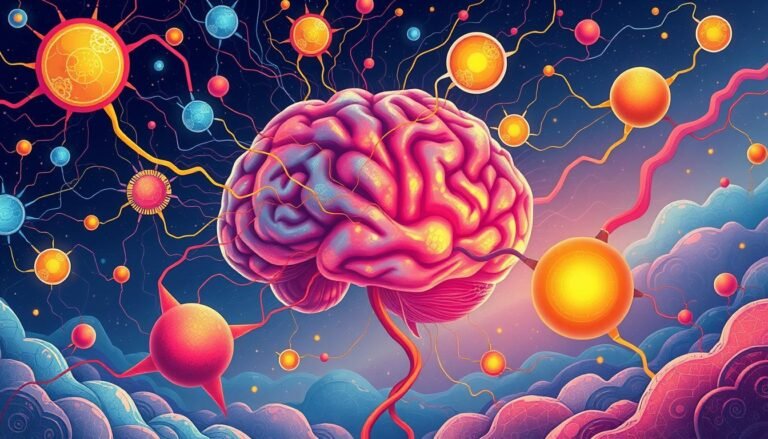Personality and Anxiety Disorders: Understanding Both
Dr. Emma Chen, a well-known psychologist, told a story about her patient, Sarah. Sarah was a talented architect but struggled with social anxiety and perfectionism. Her need for control often conflicted with her fear of being judged, causing her to miss out on chances and hurt her relationships.
Personality disorders are quite common, affecting many people worldwide. They involve behaviors that are different from what’s usually seen. Anxiety disorders, like Sarah’s social anxiety, also have a big impact on daily life. The mix of these two conditions is complex and interesting, making it hard to tell them apart.
Studies show that some personality types are more likely to have anxiety disorders. For example, people with high neuroticism or emotional instability might be more at risk for generalized anxiety disorder. Those with avoidant personality traits often deal with social anxiety. This shows why treating mental health needs a complete approach.
Key Takeaways
- Personality disorders are among the most common psychological disorders worldwide
- Anxiety disorders frequently co-occur with personality disorders
- Cluster C personality disorders are particularly common in individuals with anxiety disorders
- Certain personality traits can increase the likelihood of developing anxiety disorders
- Understanding the relationship between personality and anxiety is crucial for effective treatment
Introduction to Personality and Anxiety Disorders
Personality disorders and anxiety disorders are serious mental health issues. They are expected to cause a lot of social and economic problems by 2030. It’s important to know how personality traits and mental illness are connected to treat and prevent these conditions.
Defining Personality Disorders
Personality disorders involve long-lasting patterns of behavior and thoughts that are different from what’s normal. These patterns affect how people see themselves, interact with others, and handle their environment. They can make it hard for people to live their daily lives.
Overview of Anxiety Disorders
Anxiety disorders are about feeling too much fear and avoiding things that seem scary. They often happen with other mental health issues like depression, alcoholism, and substance use. Research shows that up to 20% of cancer patients get depressed, and 10% get anxious, compared to 5% and 7% of the general public.
The Interconnection Between Personality and Anxiety
Personality traits are key in how anxiety disorders develop and show up. Studies have found that being very neurotic, not outgoing, and having certain personality disorder traits can increase the risk of anxiety. Also, anxiety in early life can shape personality, showing a complex relationship between these two mental health areas.
| Personality Trait | Impact on Mental Health |
|---|---|
| Neuroticism | Linked to major depression, anxiety disorders, and substance use disorders |
| Extraversion | Helps protect against suicidal thoughts |
| Emotional Stability | Has a strong link to well-being |
It’s vital to understand how personality disorders and anxiety disorders are connected. This knowledge helps in creating better treatments and improving patient results. As research in this area keeps growing, it will help us understand more about the complex links between personality traits and mental illness.
The Historical Development of Personality Theories
Personality theories have changed a lot over time. Hippocrates, an ancient Greek doctor, started it all with the “humoral doctrine.” He linked personality types to four body fluids. This idea helped shape future studies on personality.
In the 20th century, Hans Eysenck made big steps in personality research. He found three main traits: extroversion, neuroticism, and psychoticism. His work linked personality to biology, setting the stage for today’s theories.
The Big Five theory came later, offering a detailed model. It includes five main traits: openness, conscientiousness, extroversion, agreeableness, and neuroticism (OCEAN). This model is now a key part of psychology.
Recently, Cloninger’s physiological theory has made new connections. It ties personality to neurotransmitters like dopamine, serotonin, and norepinephrine. This shows how biology affects our personality.
| Theory | Key Concepts | Impact |
|---|---|---|
| Humoral Doctrine | Four body fluids | Early foundation |
| Eysenck’s Dimensions | Extroversion, Neuroticism, Psychoticism | Biological basis |
| Big Five | OCEAN dimensions | Widely accepted model |
| Cloninger’s Theory | Neurotransmitter links | Physiological approach |
These theories show how far we’ve come from ancient ideas to today’s science. Each one helps us understand why we’re all different.
Common Types of Anxiety Disorders
Anxiety disorders are mental health conditions that cause too much worry and fear. They can make everyday tasks hard. Let’s look at some common anxiety disorders.
Generalized Anxiety Disorder (GAD)
GAD is when you worry too much about life. People with GAD feel restless, can’t focus, and have trouble sleeping. This constant worry can be very tiring and affect daily life.
Social Anxiety Disorder
Social anxiety disorder makes social situations very scary. People might blush, sweat, or shake in these situations. They often have trouble making eye contact and fear what others think of them. This makes socializing and speaking in public very hard.
Panic Disorder
Panic disorder causes sudden, intense fear episodes. During a panic attack, you might feel your heart racing, chest pain, and feel like something bad is going to happen. Some people have many attacks in one day.
Obsessive-Compulsive Disorder (OCD)
OCD is about unwanted thoughts (obsessions) and actions (compulsions) that keep coming back. These can take up a lot of time and cause a lot of stress. OCD can show up in different ways, like cleaning too much or checking things over and over.
| Anxiety Disorder | Prevalence in U.S. Adults | Key Symptoms |
|---|---|---|
| Generalized Anxiety Disorder | 2.9% | Excessive worry, restlessness, difficulty concentrating |
| Social Anxiety Disorder | 7% | Fear of social situations, blushing, sweating |
| Panic Disorder | 2-3% | Sudden panic attacks, heart palpitations, chest pain |
| Specific Phobias | 8-12% | Intense fear of specific objects or situations |
It’s important to know about these anxiety disorders to recognize symptoms and get help. Treatments like Cognitive Behavioral Therapy (CBT) and medicine can help. They can make life less anxious and more fulfilling.
Personality Traits and Their Influence on Anxiety
Personality traits greatly affect our mental health, especially with anxiety. The Big Five personality traits give us insights into how our traits can make us more anxious.
Neuroticism is a key trait linked to anxiety. Those with high neuroticism scores tend to feel anxious more often. This includes fears, panic, and obsessive thoughts.
Extraversion, however, seems to protect against anxiety. People who are less outgoing face a higher risk of anxiety, especially social fears. Introverts might feel isolated, which can make anxiety worse.
Conscientiousness also plays a role. It’s about being disciplined and patient. This can help manage stress better.
| Personality Trait | Impact on Anxiety |
|---|---|
| High Neuroticism | Increased risk of anxiety disorders |
| Low Extraversion | Higher likelihood of social phobia and agoraphobia |
| High Conscientiousness | Potential protective factor against anxiety |
Knowing how personality traits affect anxiety helps identify who might struggle. Mental health experts can then create better treatments. This makes help more effective for those with anxiety.
Neurotransmitters and Their Role in Personality and Anxiety
Neurotransmitters are key in shaping our personality and anxiety levels. They are chemical messengers in our brain that influence how we think, feel, and act. Let’s look at three important neurotransmitters and how they affect our mental health.
Dopamine and reward-seeking behavior
Dopamine is linked to reward and motivation. It drives us to seek out pleasurable experiences and plays a crucial role in learning and memory. People with high dopamine levels may be more outgoing and prone to risk-taking.
Serotonin and mood regulation
Serotonin is often called the “feel-good” neurotransmitter. It helps regulate mood, sleep, and appetite. Low serotonin levels are linked to depression and anxiety. Sunlight can boost serotonin levels, which might explain why some people feel mood changes with the seasons.
Norepinephrine and stress response
Norepinephrine is involved in our body’s stress response. It increases alertness and focuses attention. In anxiety disorders, an overactive norepinephrine system can lead to excessive worry and heightened stress reactions.
| Neurotransmitter | Function | Impact on Personality | Relation to Anxiety |
|---|---|---|---|
| Dopamine | Reward and motivation | Extroversion, risk-taking | Low levels may increase anxiety |
| Serotonin | Mood regulation | Emotional stability | Low levels linked to anxiety and depression |
| Norepinephrine | Stress response | Alertness, focus | Overactivity can cause excessive worry |
Understanding these neurotransmitters helps explain the complex relationship between personality traits and anxiety disorders. It also highlights potential avenues for treatment, such as medications that target specific neurotransmitter systems to alleviate anxiety symptoms.
The Impact of Personality Types on Anxiety Experiences
Personality types greatly affect how we experience anxiety. The Big Five Model helps us understand this by breaking traits into five categories. These are Openness, Conscientiousness, Extraversion, Agreeableness, and Neuroticism.
Type A personalities are known for their drive to succeed and competitiveness. This can lead to more job stress. On the other hand, Type B personalities are more relaxed and less competitive, which can lower stress levels. However, they might turn to substance use as a way to cope.
High neuroticism and low extraversion can lead to unhealthy stress management. Research suggests that 20% to 60% of our temperament is inherited. This can affect how prone we are to anxiety.
| Personality Type | Anxiety Experience | Common Coping Mechanisms |
|---|---|---|
| Type A | High stress, job-related anxiety | Overachievement, self-criticism |
| Type B | Lower stress levels | Relaxation, potential substance use |
| Introverts | Social anxiety, fear of negative evaluation | Avoidance, isolation |
| Extraverts | Performance anxiety, social boldness | Seeking social support, active problem-solving |
Introverts and extroverts have different anxiety experiences. Introverts often face social anxiety and fear of being judged. They might avoid social situations. Extraverts, while more outgoing, can feel anxious in situations where they need to perform well.
It’s important to understand how personality and anxiety are connected. This knowledge helps in finding better ways to cope with anxiety and tailor treatments for those who struggle with it.
Personality and Anxiety Disorders: Understanding Both
Personality disorders and anxiety disorders often happen together. This creates a complex mix of symptoms and challenges. It’s more common than you might think, affecting diagnosis and treatment.
Co-occurrence Rates and Clinical Implications
Research shows a high rate of both conditions happening together. A study of 97 patients with anxiety disorders found big problems with personality functioning. This makes diagnosis and treatment plans harder.
Cluster C Personality Disorders and Anxiety
Cluster C personality disorders, like obsessive-compulsive personality disorder (OCPD), are closely linked to anxiety disorders. OCPD is different from obsessive-compulsive disorder (OCD). People with OCD know their anxiety, but those with OCPD see their strict routines as normal.
Impact on Treatment Outcomes
Having both personality and anxiety disorders can make treatment harder. Patients with both conditions often have worse symptoms and may not respond well to therapy. For example, OCPD patients might find it hard to change, while OCD patients might do better with therapy and medication.
- OCD treatment may include behavioral therapy and anti-depressants
- OCPD individuals might resist psychotherapy due to lack of self-awareness
- Comorbidity can lead to increased suicide risk and anxiety severity
Healthcare providers need to understand these complex relationships. This is key to creating effective, personalized treatment plans for those with both personality and anxiety disorders.
Treatment Approaches for Comorbid Personality and Anxiety Disorders
Treating comorbid disorders needs a custom plan. Anxiety disorders affect about 10% of people and often go hand in hand with personality disorders. This mix makes treatment harder for doctors.
Cognitive behavioral therapy (CBT) is a top choice. It helps patients change their negative thoughts. CBT works well for both anxiety and personality disorders.
Medication is also key. Antidepressants and anti-anxiety drugs help manage symptoms. But, they work best with therapy.
Personalized treatment plans are vital. They might include:
- Group therapy sessions
- Mindfulness practices
- Stress management techniques
Studies show women are more likely to get anxiety disorders. The age when these disorders start varies. Some start in childhood, others in adulthood.
Good results come from treating both disorders together. This approach leads to better long-term outcomes. It also improves patients’ quality of life.
Conclusion
The link between personality and anxiety disorders is key in mental health. Studies with 97 patients and 16 healthy controls have shown this. They found that people with anxiety disorders face big challenges in their personality.
Those with both anxiety and personality disorders face even more issues. This shows why treating both is important. The study also found a link between some personality disorders and substance use.
Future research should aim to improve diagnosis and treatment. As we learn more, we can help people more effectively. With new tech and methods, mental health is set to make big progress.
Source Links
- Understanding Anxiety and Personality Disorders
- Is Your Anxiety Disguising Other Feelings?
- Personality and anxiety disorders – Current Psychiatry Reports
- Anxious Personality Traits: Perspectives from Basic Emotions and Neurotransmitters
- Personality and anxiety disorders
- What Personality Theories in Psychology May Tell You About Yours
- 12.2 The Origins of Personality
- The evolution of personality disorders: A review of proposals
- Anxiety Disorders
- What are Anxiety Disorders?
- Anxiety Disorder Personality Traits | BrainsWay
- A longitudinal study of personality traits, anxiety, and depressive disorders in young adults
- The Neurobiology of Anxiety Disorders: Brain Imaging, Genetics, and Psychoneuroendocrinology
- Neurotransmitters: What they are, functions, and psychology
- Personality Types, Personality Traits, and Mental Health
- Frontiers | The role of personality traits in mediating the relation between fear of negative evaluation and social interaction anxiety
- Anxiety Disorder Vs. Personality Disorder: Differences?
- Personality functioning in anxiety disorders
- Treatment for Anxiety and Comorbid Depressive Disorders: Transdiagnostic Cognitive-Behavioral Strategies
- Treatment of anxiety disorders – PMC
- Personality functioning in anxiety disorders – BMC Psychiatry
- Personality Disorders: Summary And Conclusion








